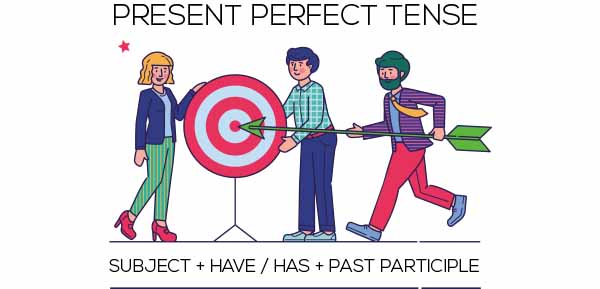What is the Present Perfect?
The present perfect simple is an English tense which is used to express an action that started before and still going on or stopped recently. The present perfect is formed using the following rule:
Affirmative sentences: Subject + have / has + Past Participle.
Negative sentences: Subject + haven’t / hasn’t + Past Participle.
Question sentences: Have / has + Subject + Past Participle.
When to use:
1) Unspecified period before the current time:
We use the present perfect to talk about an action happened at an unspecified time, which is not important. Therefore, you should not use this tense with specific time expressions like last week, two year ago, yesterday…etc. However, you can consider the following expressions instead: once, many times, before, already, so far…etc.
- I have listened to that song several times.
- I think I have met her before.
- There have been many tourists in Town.
- People have traveled to Paris multiple times.
- People have not seen the moonlight yet.
- Have you read the title of that movie yet?
- Nobody has ever swum the Atlantic.
2) Change over time:
We use the present perfect to talk about change that takes place over a period of time.
- My dog has grown since the last time I saw it.
- She has become more interested in arts.
- Rap music has become one of the most popular genres.
- My English has really improved since I began talking to foreign students.
3) Achievements:
We use the present perfect tense to talk about achievement without putting emphasis on a specific time.
- My friend has graduated from medical school.
- Our son has learned how to walk.
- Science has helped unravel many mysteries.
- Doctors have cured several viruses.
4) Unfinished actions:
We can use the present perfect to talk about actions which have not happened yet, and we are still waiting for those actions to happen.
- Ahmed has not finished his daily tasks yet.
- Susan has not mastered Spanish, but she can communicate.
- James has still not arrived at the train station.
- The snow has not stopped.
5) Multiple actions during different times:
Among other uses of the present perfect is when we want to express the idea of having multiple actions that happened in the past and still take place in the current time.
- The country’s economy has progressed five times this year.
- I have had four glasses of water and five different fruits so far today.
- We have had many major problems trying to solve these equations.
- She has tried several keys to open her bedroom door, but no key seems to successfully open it.
6) Present perfect with the adverbs:
You can use the present perfect tense before an adverb such as: still, always, only, never, ever, just, etc.
- You have only played that game one time.
- Have you only played that game one time?
7) Present perfect tense in the active or passive sentences:
- Active: Many English learners have read this book.
- Passive: This book has been read by many English learners.
HOW TO USE:
Affirmative: You have played that game many times.
Question: Have you played that game many times?
Negative: You have not played that game many times.
| Subject | Have | Past Participle | Rest of the Sentence |
|---|---|---|---|
| I | have | studied | for the finals. |
| you | have | bought | a new backpack. |
| He | has | eaten | my apples. |
| She | has | been | happy all day. |
| She | has | bought | coffee this week. |
| We | have | lost | the keys. |
| You | have | tried | to speak English. |
| They | have | forgotten | my name. |
Negative sentences:
The contraction of the perfect tense in negative form is:
Have not = Haven’t
Has not = Hasn’t
| Subject | have | Past Participle | Rest of the Sentence |
|---|---|---|---|
| I | haven’t | studied | for the finals. |
| you | haven’t | bought | a new backpack. |
| He | hasn’t | eaten | my apples. |
| She | hasn’t | been | happy all day. |
| She | hasn’t | bought | coffee this week. |
| We | haven’t | lost | the keys. |
| You | haven’t | tried | to speak English. |
| They | haven’t | forgotten | my name. |
Questions
To form questions in the present perfect, all you have to do is to invert the subject with verb:
| Have | Subject | Past Participle | Rest of the Sentence |
|---|---|---|---|
| Have | I | been | chosen for the team? |
| Have | you | bought | a new car? |
| Have | he | eaten | my sandwich? |
| Has | she | written | the letter? |
| Has | she | started | on time? |
| Have | we | won | a trophy? |
| Haven’t | you | kept | my secret? |
| Have | they | driven | there? |

